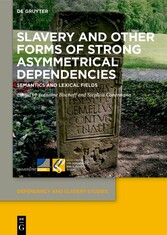Slavery and Other Forms of Strong Asymmetrical Dependencies - Semantics and Lexical Fields
von: Jeannine Bischoff, Stephan Conermann
Walter de Gruyter GmbH & Co.KG, 2022
ISBN: 9783110787047
, 262 Seiten
Format: ePUB
Kopierschutz: Wasserzeichen
Preis: 0,00 EUR
eBook anfordern 
Mehr zum Inhalt

Slavery and Other Forms of Strong Asymmetrical Dependencies - Semantics and Lexical Fields
In this volume, we approach the phenomenon of slavery and other types of strong asymmetrical dependencies from two methodologically and theoretically distinct perspectives: semantics and lexical fields.
Detailed analyses of key terms that are associated with the conceptualization of strong asymmetrical dependencies promise to provide new insights into the self-concept and knowledge of pre-modern societies. The majority of these key terms have not been studied from a semantic or terminological perspective so far.
Our understanding of lexical fields is based on an onomasiological approach - which linguistic items are used to refer to a concept? Which words are used to express a concept? This means that the concept is a semantic unit which is not directly accessible but may be manifested in different ways on the linguistic level. We are interested in single concepts such as 'wisdom' or 'fear', but also in more complex semantic units like 'strong asymmetrical dependencies'.
In our volume, we bring together and compare case studies from very different social orders and normative perspectives. Our examples range from Ancient China and Egypt over Greek and Maya societies to Early Modern Russia, the Ottoman Empire and Islamic and Roman law.
Jeannine Bischoff, University of Bonn, Germany; Stephan Conermann, University of Bonn, Germany.










